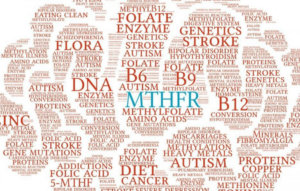When it comes to optimizing your health there are a lot of small details that often get overlooked by the mainstream narratives, yet some of them can make a big difference. The MTFHR gene mutation and its relationship with folic acid is one such detail that so many guys are totally unaware of even though it may significantly impact their energy levels, mental clarity, heart health, and overall wellness – all big things for the modern man. Understanding this connection and making simple adjustments can transform your health and vitality. Let’s take a look.
What Is MTFHR and Why Should You Care?
The MTFHR (methylenetetrahydrofolate reductase) gene plays a critical role in your body’s methylation process – a biochemical reaction involved in DNA repair, detoxification, neurotransmitter production, and more. This gene produces an enzyme that converts folate (vitamin B9) into its active form, 5-MTHF (5-methyltetrahydrofolate), which is essential for several key functions in the body.
detoxification, neurotransmitter production, and more. This gene produces an enzyme that converts folate (vitamin B9) into its active form, 5-MTHF (5-methyltetrahydrofolate), which is essential for several key functions in the body.
But here’s the catch: An estimated 30-50% of people carry a mutation in the MTFHR gene that impairs its function. If you have this mutation, your body likely struggles to properly process folic acid, the synthetic form of folate commonly found in fortified foods and many supplements. For guys, this can have far-reaching consequences on fertility, heart health, mental performance, and energy levels.
Folic Acid vs. Folate: The Key Difference
Understanding the difference between folic acid and folate is crucial.
- Folate is the natural form of vitamin B9 found in foods like leafy greens, avocados, and legumes. It is easily processed by the body and converted into 5-MTHF, which is the usable form of this nutrient.
- Folic acid, on the other hand, is a synthetic version of folate used to fortify processed foods like bread, cereals, and pasta. While it’s designed to prevent folate deficiency, it relies on the MTFHR enzyme for conversion into 5-MTHF. For those with MTFHR mutations, this conversion process is inefficient, leading to unmetabolized folic acid circulating in the bloodstream.

The Hidden Dangers of Unmetabolized Folic Acid
For men with MTFHR mutations, consuming large amounts of folic acid can backfire. Instead of supporting health, unmetabolized folic acid can build up in the bloodstream, potentially leading to:
- Elevated Homocysteine Levels: Poor methylation leads to an accumulation of homocysteine, an amino acid linked to an increased risk of cardiovascular diseases.
- Chronic Inflammation: A buildup of unmetabolized folic acid can trigger inflammation, which is a root cause of many chronic health issues.

- Detoxification Problems: A sluggish methylation process can impair your body’s ability to properly eliminate toxins.
- Cognitive Decline: Folic acid buildup may interfere with brain function and proper brain development in children, leading to brain fog, anxiety, and depression.
How MTFHR Affects Men’s Health Specifically
For men, the combination of MTFHR mutations and excessive folic acid intake can impact critical areas of health:
- Fertility: Healthy sperm production relies on proper methylation. Impaired folate metabolism can lead to decreased sperm count and quality, making it harder to conceive.
- Heart Health: Elevated homocysteine levels associated with poor methylation increase the risk of heart disease and stroke.
- Mental Health: The link between methylation and neurotransmitter production means that MTFHR mutations can contribute to mental health struggles, including depression, anxiety, and irritability.
- Energy Levels: Methylation is closely tied to mitochondrial function, the energy powerhouses of your cells. When methylation is compromised, fatigue and sluggishness can follow.

How to Tell If You Have an MTFHR Mutation
The only way to know if you have an MTFHR mutation is through genetic testing. Popular services like 23andMe or specialized labs offer insights into your genetic profile, including whether you carry one or two copies of the mutation. Having one copy (heterozygous) may lead to mild inefficiencies, while two copies (homozygous) typically result in more pronounced issues.
Common Sources of Folic Acid
Fortified foods are everywhere, and avoiding folic acid requires a conscious effort. Common culprits include:
- Packaged Bread and Bakery Products: Most commercial bread, bagels, and pastries are fortified with folic acid.

- Breakfast Cereals: Popular brands often add synthetic folic acid to meet government fortification requirements.
- Energy Drinks and Protein Powders: Many health products sneak in synthetic vitamins, including folic acid.
- Multivitamins: Unless specified, most contain folic acid instead of its active form.
The good news? With a little label reading and selective purchasing, you can find alternatives and clear your diet of folic acid.
What You Can Do to Protect Your Health
If you suspect or know you have an MTFHR mutation, here are some simple, actionable steps to optimize your health:
- Switch to Active Folate (5-MTHF)
Look for supplements that contain L-methylfolate instead of folic acid. These bypass the need for MTFHR conversion and are immediately usable by your body.
- Choose Whole, Folate-Rich Foods
Instead of relying on fortified products, focus on natural sources of folate, such as:- Spinach, kale, and other leafy greens
- Asparagus
- Avocados
- Lentils and chickpeas
- Eggs
- Avoid Processed Foods
Limit your intake of heavily processed and fortified foods. Stick to whole, nutrient-dense options whenever possible. - Get Regular Health Screenings
Monitor your homocysteine levels through routine blood work. Elevated levels may indicate poor methylation and increased cardiovascular risk. - Work With a Specialist
A functional medicine doctor or nutritionist can help you develop a personalized plan, including dietary adjustments and appropriate supplementation.
The Bigger Picture: Why This Matters
The MTFHR mutation is not a rare phenomenon, and its implications are far-reaching. For men, understanding how this gene impacts their health is a critical step toward achieving better energy, fertility, and longevity. By addressing the folic acid issue and focusing on active, bioavailable nutrients, you can ensure your body operates at its full potential.
Closing Thoughts
Guys, we’ve got to stop guessing when it comes to our health. MTFHR mutations and the widespread use of folic acid in fortified foods may seem like a small issue, but their impact can be severe. By understanding this connection and making more informed choices, you can take significant steps toward better health and resilience. Don’t let something as simple as the wrong type of folate added by big food and ag hold you back – simplify your approach, get to the good stuff, and thrive.












